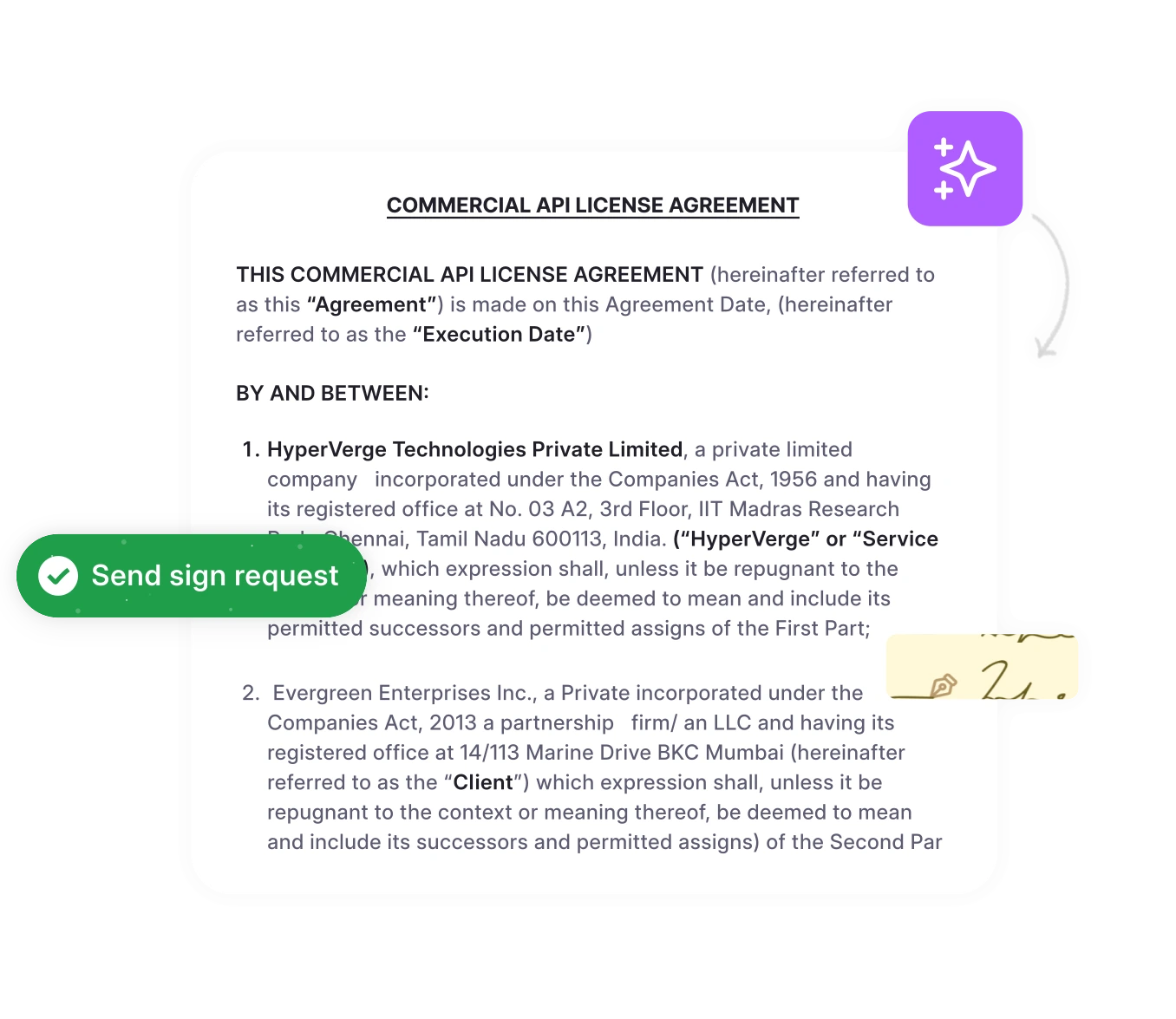Every business agreement goes beyond signatures and terms—it’s built on trust. In employment contracts, settlement discussions, or business partnerships, organizations often exchange sensitive information such as trade secrets, financial data, or client lists. If that information is disclosed, the fallout can include reputational harm, economic loss, or contract disputes.
Confidentiality clauses safeguard against those risks. These provisions create binding obligations that prevent parties from misusing or sharing private details. By defining what qualifies as confidential, who can access it, and how long protection applies, they give businesses the confidence to collaborate securely.
Crafting an effective confidentiality clause requires more than standard language. Knowing when to use them, what to include, and how to enforce them is essential for legal teams managing multiple contracts.
What is a confidentiality clause?
A confidentiality clause is a contractual provision that requires one or more parties to keep specific information private and not disclose it to third parties. Also called a non-disclosure provision, it creates enforceable legal duties that protect sensitive business data, trade secrets, personal information, or proprietary materials.
Beyond secrecy, these contract clauses define what qualifies as confidential, set boundaries for information sharing, specify how long obligations last, and outline penalties for unauthorized disclosure. Unlike informal promises, they are legally binding and enforceable in court if breached.
Confidentiality clauses may appear as standalone agreements or as part of broader contracts like employment, settlement, or partnership agreements. Their scope and structure vary depending on the type of information involved and the relationship between the parties.
Understanding these foundational elements helps ensure your confidentiality provisions provide necessary protection while remaining legally enforceable.
What are the key elements of a confidentiality clause?
Creating an enforceable confidentiality clause requires including several essential elements that work together to provide comprehensive protection. Here are the 5 critical components every adequate confidentiality provision should contain:
1. Clear definition of confidential information
The clause must specify what qualifies as confidential information, such as trade secrets, customer data, financial advisors’ reports, or business secrets. Information confidential by nature must be treated as strictly confidential, and the agreement’s confidential obligations should clearly define its scope. Without clarity, a party may argue that only that portion of the data disclosed was sensitive, weakening enforceability.
Government guidance on confidential information law stresses that the information must be secret (not generally known), have commercial value because it is secret, and be subject to reasonable measures taken by the owner to keep it confidential. This aligns with the need for a clear, specific definition that identifies the information for protection as trade secrets or undisclosed commercial information.
2. Identification of parties and obligations
The clause should clearly identify the disclosing party and the receiving party, specifying each confidentiality obligation. A party acknowledges that they must not disclose confidential information or the other party’s confidential information without prior consent. Employers may expressly permit disclosure in limited contexts, but otherwise the employer’s confidential information and sensitive data remain protected.
3. Duration and scope limitations
Effective confidentiality clauses specify how long obligations will last and under what circumstances they might end. Some information may require permanent protection, while other data might need only temporary confidentiality.
4. Permitted disclosures and exceptions
Clauses often include exceptions where such disclosure is required by applicable law, court orders, or regulatory mandates. In such cases, the disclosing party waives compliance with strict non-disclosure only to the extent necessary, ensuring the information confidential in nature is still preserved as much as possible.
5. Consequences and remedies for breach
The clause should outline what happens if confidentiality obligations are violated, including potential legal remedies, monetary damages, or injunctive relief.
Protect confidentiality without gaps
HyperStart automatically tracks clause obligations, renewal dates, and compliance alerts to prevent costly breaches.
Book a DemoThese key elements ensure your confidentiality clause provides necessary protection while remaining enforceable under applicable laws, setting the foundation for understanding where these provisions can be most effectively utilized.
Where can confidentiality clauses be used?
Confidentiality clauses serve important protective functions across a wide range of legal and business contexts, making them versatile tools in various agreements and relationships. Here is a list of 5 situations where confidentiality clauses would be included.
1. Employment contracts
Employment agreements often include confidentiality clauses to protect trade secrets, customer information, and business strategies that employees access during their tenure. These obligations typically extend beyond employment, ensuring ongoing protection of sensitive information even after an employee leaves the organization.
2. Settlement agreements
Confidentiality clauses in settlement agreements prevent parties from disclosing resolution terms or details of underlying disputes. They protect reputations, stop terms from being used as precedent, and make settlements more appealing to parties wishing to avoid public scrutiny.
3. Business partnerships and joint ventures
Partnerships and joint ventures rely on mutual confidentiality provisions to safeguard proprietary data, technical specifications, and strategic plans exchanged during collaboration. These clauses allow companies to evaluate opportunities or complete joint projects without risking exposure.
4. Service agreements and vendor contracts
Confidentiality clauses in service and vendor contracts protect client data, business processes, and other sensitive information accessed by providers. They are especially critical in regulated industries like healthcare, finance, and technology, where compliance requires strict data protection.
5. Mergers and acquisitions
M&A transactions almost always involve confidentiality agreements to secure financial information, proprietary data, and strategic details shared during due diligence. These provisions protect both parties while enabling open evaluation of the deal.
Understanding these diverse applications helps inform the legal implications these clauses carry across different contexts.
What are the legal implications of a confidentiality clause?
Confidentiality clauses create binding legal obligations that carry significant implications for all parties involved. Understanding these 4 legal consequences is essential for both drafting effective clauses and ensuring compliance.
1. Breach and legal remedies
A breach of a confidentiality clause can trigger significant consequences. Courts may award monetary damages for losses such as lost profits, damaged relationships, or mitigation costs. In some cases, injunctive relief may also be granted to prevent further disclosure or require the return of confidential materials.
According to a Toronto-based law firm, damages may include “an account of profits,” meaning the disclosing party may have to surrender gains derived from the misuse of confidential information. Legal claims can also extend to breach of fiduciary duty or other contract claims, and the fallout often results in business relationship breakdowns that lead to costly and complex litigation.
2. Enforceability factors
The enforceability of confidentiality clauses depends on their scope, duration, and geographic limitations. Courts closely scrutinize these terms to ensure they are reasonable and do not overly restrict competition or free speech. Clauses deemed too broad or indefinite may be ruled unenforceable or adjusted to narrower limits.
3. Jurisdictional differences
Enforcement approaches vary across jurisdictions. Some regions have statutes specifically governing trade secret protection or confidentiality agreements, while others rely mainly on common law. Understanding the applicable legal framework is critical for drafting enforceable clauses.
4. Regulatory considerations
Regulatory requirements may also affect confidentiality clauses. Organizations must ensure their provisions comply with applicable laws while still providing adequate protection for sensitive information.
Standardize every confidentiality clause
Ensure enforceability and consistency with HyperStart’s clause library and AI-powered contract drafting tools.
Book a DemoThese legal complexities highlight the importance of carefully considering the pros and cons before implementing confidentiality provisions in settlement agreements.
What are the pros and cons of a confidential settlement?
Confidential settlements offer distinct advantages and disadvantages that parties should carefully weigh before agreeing to confidentiality provisions in resolution agreements.
Benefits of confidential settlement:
1. Reputation protection for all parties
Confidential settlements prevent negative publicity that might damage business relationships, professional reputations, or public standing, particularly valuable for companies concerned about customer confidence or stock impacts.
2. Avoiding precedent-setting outcomes
Keeping settlement terms private prevents their use as leverage in similar future disputes or creating expectations for comparable settlement amounts.
3. Encouraging honest negotiation
Privacy often enables more open settlement discussions, as parties can explore creative solutions without public scrutiny concerns.
Confidential settlements present significant drawbacks:
1. Limited deterrent effect
When settlements remain confidential, they may not deter similar conduct, potentially allowing harmful behavior to continue.
2. Reduced accountability and transparency
Confidential settlements can prevent public awareness of important issues, particularly involving public safety, discrimination, or corporate misconduct.
3. Enforcement challenges
Monitoring compliance with confidentiality provisions and proving violations can be difficult and expensive.
Balancing these competing considerations requires careful evaluation of specific circumstances and priorities, which leads to essential factors parties should consider before agreeing to any confidentiality obligations.
What should be considered before agreeing to a confidentiality clause?
Before committing to confidentiality obligations, parties should carefully evaluate these 3 important factors that could significantly impact future rights and contract obligations.
1. Scope and definition clarity
Examine exactly what information the clause covers and whether definitions are reasonable and specific. Over-expansion may inadvertently cover a party’s own confidential information or general knowledge.
2. Duration and temporal limitations
Consider whether obligations to keep information strictly confidential should last indefinitely or only for a reasonable time. While trade secrets might warrant permanent protection, other business information may only need temporary confidentiality.
3. Impact on future opportunities
Confirm the clause does not unfairly restrict such parties from using skills or independently developed knowledge while protecting the confidential nature of sensitive data. Consider whether confidentiality obligations might limit your ability to work with other parties, pursue similar business opportunities, or use general knowledge and skills developed during contractual relationships.
Detect, track, and enforce clauses effortlessly
HyperStart AI identifies confidentiality terms across contracts and ensures they remain binding throughout the lifecycle.
Book a DemoTaking time to evaluate these considerations can prevent future conflicts and ensure confidentiality provisions serve legitimate protective purposes without creating unnecessary restrictions, which modern technology solutions can help manage more effectively.
How do CLM platforms help with confidentiality clauses?
Modern contract lifecycle management platforms provide sophisticated tools that transform how organizations handle confidentiality clauses across their entire contract portfolio.
Additionally, they also address many challenges legal teams face when managing confidential information obligations at scale, as stated below.
1. Automated metadata extraction capabilities
It enables CLM platforms to identify and catalog confidentiality provisions across thousands of contracts automatically. AI-powered contract management software can locate confidentiality clauses, extract key terms like duration periods and scope definitions, and organize information in searchable databases, ensuring no confidentiality obligations are overlooked.
2. Centralized contract repository functionality
These centralized contract repositories provide secure storage and access controls supporting confidentiality compliance efforts. CLM platforms implement role-based permissions restricting access to sensitive contracts, creating audit trails tracking who accessed information and when, helping organizations demonstrate compliance.
3. Obligation tracking and renewal management
It helps legal teams monitor confidentiality clause requirements proactively. Platforms can set automated reminders for expiring confidentiality periods, track ongoing obligations requiring periodic review, and alert stakeholders about upcoming compliance deadlines, preventing breaches from oversight.
4. Template standardization and clause library capabilities
This enables organizations to maintain consistent confidentiality language across different agreement types. CLM platforms store approved confidentiality clause templates, suggest appropriate provisions based on contract type and context, ensuring new agreements incorporate necessary protective language.
These technological capabilities provide systematic approaches necessary for effective confidential information protection across complex organizational structures.
Strengthening confidentiality with HyperStart
Confidentiality clauses are essential for protecting sensitive information in employment contracts, partnerships, and dispute resolutions. Their effectiveness relies on careful drafting, clear scope, and consistent enforcement.
As organizations manage complex obligations across multiple contracts, systematic oversight becomes critical. Breaches not only create legal risks but also operational challenges for compliance. Modern Contract Lifecycle Management (CLM) solutions, like HyperStart, help legal teams streamline clause management, monitor contract obligations, and safeguard business interests more effectively.
By adopting the right tools, professionals can reduce risks, ensure compliance, and strengthen the protection of confidential information across all agreements.












